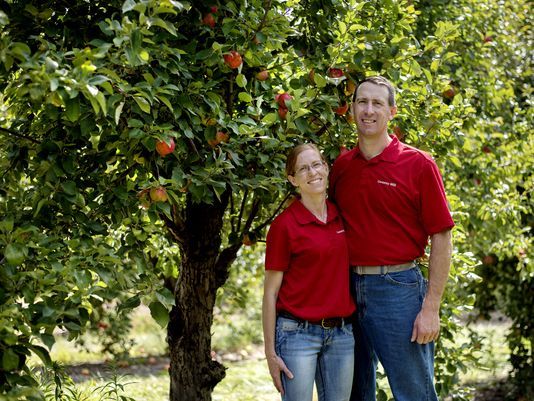A federal district judge Friday issued a preliminary injunction against the city of East Lansing that allows a Charlotte farmer to return to the city's farmers market for the remainder of the 2017 season.
That could happen as soon as Sunday.
Country Mill owner Steve Tennes sued the city earlier this year after it banned him from the market over his decision last year to refuse to hold same-sex weddings at his farm and orchard near Charlotte.
Tennes said he intends to sell his wares at the East Lansing market beginning this Sunday. The orchard was in contact with city officials on Friday to make those arrangements, an attorney for Tennes said.
City officials said in a news release they will consider seeking an appeal and a stay of the ruling.
"In the meantime, the city will comply with the ruling ... and urges those who may also be disappointed in the ruling to respect the court's decision," the release said.
The release said that "a significant event" is scheduled at the market this weekend. Officials are asking that everyone who attends "respect each other and the sometimes conflicting views that people have," it said.
East Lansing Mayor Mark Meadows and City Manager George Lahanas did not return phone messages left for them by the State Journal on Friday afternoon.
"We are looking forward to returning back to the East Lansing Farmer's Market immediately and serving all of our customers there, as we have for the past seven years," Tennes said in a telephone interview. "We are looking forward to reconnecting with customers and increasing the availability of locally grown, organic apples and cider."
East Lansing informed Tennes in March that he’d been denied a vendor’s license after six years of participation in the farmers market. The reason, city officials said, was a December Facebook post in which Tennes announced he would continue holding weddings at his Charlotte orchard, while reserving the right to deny same-sex couples who wished to marry at the venue.
In its March letter, East Lansing said the business practices described in the post were not in line with its farmer’s market guidelines. The guidelines had been changed between December and March to include "general business practice" among the areas where its anti-discrimination policy applied for vendors.
In his order, Judge Paul Maloney wrote that "The City of East Lansing must allow Plaintiffs to participate in the East Lansing Farmer’s Market for the remainder of the 2017 season. On the evidence before this Court, the City amended its Vendor Guidelines and then used the changes to deny Country Mill’s vendor application. There exists a substantial likelihood that Plaintiffs will be able to prevail on the merits of their claims for speech retaliation and for free exercise of religion."
East Lansing's market is held on Sundays through October.
Lawyers with Alliance Defending Freedom, the religious freedom advocacy group representing Tennes, argued the guidelines changes were a targeted effort to keep Tennes out of the farmer’s market.
“All we have here is a Catholic stating his faith and exercising it on his farm,” Tennes’ lawyer, Kate Anderson, said. “…The path that we see the city taking was clear retaliation against free speech.”
Michael Bogren, a lawyer for East Lansing, argued the case has nothing to do with free speech or freedom of religion. Instead, he said, the case is about the city’s authority to avoid doing business with an organization that discriminates.
“The message isn’t Catholics need not apply,” Bogren said. “The message is discriminators need not apply … This is not about religion. This is not about speech.”
In his ruling, Maloney said Tennes established a "substantial likelihood of success" on his claim that the city retaliated against him for exercising his right to free speech.
"The city took an adverse action; Country Mill was not allowed to participate in the 2017 Farmer's Market," the judge wrote. "Considering the totality of the circumstances, a factfinder could infer a connection between the plaintiffs' expressions about their religious beliefs on Facebook and the city's ultimate decision to deny Country Mill's vendor application."
Maloney said the orchard also established a substantial likelihood of success on its claim that the city targeted Tennes for exercising his religious beliefs.
In response to the ruling, attorneys for Country Mill said city officials changed their market policy to "shut out" Tennes because they disagreed with his religious views.
Anderson described the ruling as "a clear recognition from the court" that free speech and the freedom of religion are paramount. The city "reached outside of its jurisdiction to punish someone for (stating) views they don't agree with," she said.
"These are important rights for every American, and I think the court recognized that here," she said.
In the news release, city officials said they believe the judge relied on the orchard's complaint and "disregarded the contrary facts" listed in the city's pleadings.
Country Mills vs. East Lansing opinion and order granting motion for preliminary injunction by LansingStateJournal on Scribd
►Make it easy to keep up to date with more stories like this. Download the WZZM 13 app now.
Have a news tip? Email news@wzzm13.com, visit our Facebook page or Twitter.


